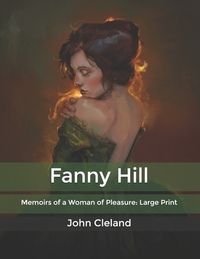Take a photo of a barcode or cover
medium-paced
Another book that I had to read for my Rise of the Novel class. Pre.recs. - Pamela and Joseph Andrews. After the first couple sex passages, it gets boring. And it gets farther and farther away from a realistic woman's mind. At first I though well this guy can write from a female perspective. And then let the penis worship begin. The more and more sex is described the more and more it becomes a glorification of male dominance. After all never once is she physically on top. The best part about the book for sure is the language Cleland uses to speak of these sexual encounters. Many a time I had to re-read passages cause I didn't know what was going where. The best reason to read this book, I believe, is simply to read a novel that although published in the 18th century wasn't legal until the 1960's ad 1970's. Oh and another note. Lady Chatterley's Lover (D.H Lawrence) was embarrassing, whereas Fanny Hill was so ridiculous that it was remotely enjoyable. If that at all makes sense.
This novel gets a bum rap, no pun intended. The 'sensuality' of the book is strong, but the story is so rich! John Cleland's writing is as good as any from the same era. Probably better than some of the more famous writers of the day. Don't shy away from this one out of embarrassment!
Orpo maalaistyttö Fanny Hill ajautuu prostituoiduksi ja kiipeää 1700-luvun himokkaan Lontoon sosiaalisissa piireissä. Fanny joutuu ottamaan elonsa turvaksi rakastajan toisensa jälkeen ja tutustuu maailman vanhimpaan ammattiin.
Jotkut kirjat vain ovat klassikkoja.
John Cleland: Fanny Hill
Tämä on niitä kirjoja joita luen aika ajoin, tuhmuus kirjassa ei ole mitään poikkeuksellista mutta tapojen kuvaus on mielenkiintoista..
Olen monesti miettinyt niitä jotka ovat lukeneet kirjan sen ollessa uutuus..
Jotkut kirjat vain ovat klassikkoja.
John Cleland: Fanny Hill
Tämä on niitä kirjoja joita luen aika ajoin, tuhmuus kirjassa ei ole mitään poikkeuksellista mutta tapojen kuvaus on mielenkiintoista..
Olen monesti miettinyt niitä jotka ovat lukeneet kirjan sen ollessa uutuus..
18th century porn. not much more to say. very clearly written for a male audience (note that fanny accepts sex with another woman but is disgusted by the concept of two men having sex)
Wow, what a romp. I was honestly surprised an 18th century writer could be so bawdy, but I stand corrected.
This book follows the story of Fanny Hill, an smallpox-orphaned 15 year old girl who essentially descends into debauchery of all kinds when she travels to London just to get by. The entire book is intensely lascivious, in fact you can't really get much further than page 15 without encountering something explicit. And somehow, through the thick fog of smut and wanton that encapsulates this book, Cleland managed to pull together a decent storyline. Although it is almost entirely comprised and driven by sex, the plot did intrigue me to an extent. It seemed to have an air of tragedy and desperation, which was interesting to see developed.
All in all, a rather good book. Evidently not for everyone due to the extravagantly voyeuristic nature of the memoirs, but if you can stand horrifyingly-in depth descriptions of intercourse, frankly hilarious euphemisms for the anatomy and a thoroughly sultry narrative, then this book is definitely fit for you.
This book follows the story of Fanny Hill, an smallpox-orphaned 15 year old girl who essentially descends into debauchery of all kinds when she travels to London just to get by. The entire book is intensely lascivious, in fact you can't really get much further than page 15 without encountering something explicit. And somehow, through the thick fog of smut and wanton that encapsulates this book, Cleland managed to pull together a decent storyline. Although it is almost entirely comprised and driven by sex, the plot did intrigue me to an extent. It seemed to have an air of tragedy and desperation, which was interesting to see developed.
All in all, a rather good book. Evidently not for everyone due to the extravagantly voyeuristic nature of the memoirs, but if you can stand horrifyingly-in depth descriptions of intercourse, frankly hilarious euphemisms for the anatomy and a thoroughly sultry narrative, then this book is definitely fit for you.
https://nwhyte.livejournal.com/3186318.html
Comparison with Candide: The purpose of the two books is very different of course. Fanny Hill is supposedly realistic - she doesn't leave London, but has plenty of adventures while there (meanwhile her first lover is banished to the South Seas). We are meant to take it as more or less documentary of what actually went on in the sex trade in mid-18th century London (probably not all that different from the sex trade before or since). It is of course meant to be very titllating, though I must say that the language used is a lot less explicit than you can find on Archive of Our Own without looking too far. Where Candide varies the geographical setting, Fanny Hill varies the sexual activity.
Both are Bildungsromane, but actually I think Fanny has the more interesting and convincing character arc. Candide has grown up a bit by the end of the book; Fanny has grown up a lot, and has moved from complete dependence to almost complete independence. She was also new to me (I had read Candide many years ago) and I enjoyed her adventures more. You can get Candide here and Fanny Hill here.
Comparison with Candide: The purpose of the two books is very different of course. Fanny Hill is supposedly realistic - she doesn't leave London, but has plenty of adventures while there (meanwhile her first lover is banished to the South Seas). We are meant to take it as more or less documentary of what actually went on in the sex trade in mid-18th century London (probably not all that different from the sex trade before or since). It is of course meant to be very titllating, though I must say that the language used is a lot less explicit than you can find on Archive of Our Own without looking too far. Where Candide varies the geographical setting, Fanny Hill varies the sexual activity.
Both are Bildungsromane, but actually I think Fanny has the more interesting and convincing character arc. Candide has grown up a bit by the end of the book; Fanny has grown up a lot, and has moved from complete dependence to almost complete independence. She was also new to me (I had read Candide many years ago) and I enjoyed her adventures more. You can get Candide here and Fanny Hill here.
The original Penthouse Letters. It’s hilarious in some of its porny bits. But it’s also interesting to see how women’s live, and sex workers for that matter, were viewed at this time. Trashy, titillating fun.
really impressive language, but really just erotic fiction - no story/plot, not really a novel in my mind, still recognize the historical significance
The tone was light and entertaining. I smiled and laughed often while listening (I borrowed the audio book from my library). While it wasn't particularly erotic for me, it was engaging. I think what I enjoyed most was the very formal language used to describe sexual situations. There were some hilarious euphemisms for genitalia. I picked it up out of a sort of historical curiosity and I'm glad I did.




